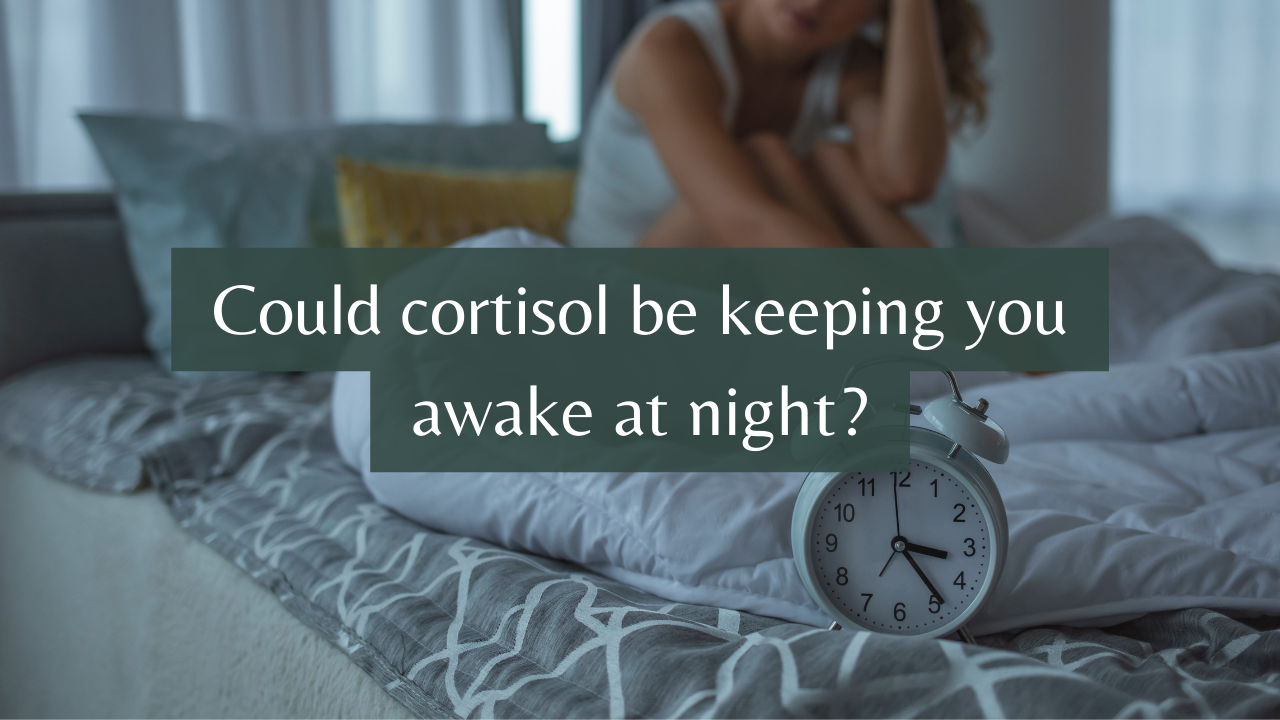Could cortisol be keeping you awake at night?
Apr 17, 2023
Cortisol is one of the major hormones in the body. In fact, it is one of the major stress hormones. Cortisol is necessary for many important functions in the body and we could not live without it. Where cortisol becomes a problem is when it is not in balance.
Cortisol Is supposed to be at its peak concentration early in the morning which helps us get out of bed and start our day, then slowly decrease throughout the day and be at its lowest at night when we are going to sleep. Cortisol and melatonin are a team and have an opposite pattern- cortisol goes low at night and melatonin levels rise to help us get ready to sleep. In the morning melatonin is at its lowest and cortisol is at its highest point. It is possible for the cortisol pattern to become dysregulated where your cortisol is higher at night when it is supposed to be low and lower in the morning when it is supposed to be high. You can also have chronic elevations in cortisol throughout the day and night and alternatively you can have low cortisol levels throughout the day and night.
Cortisol and other stress hormones like epinephrine and norepinephrine are released in higher amounts in times of perceived and actual stress - so this means that you can be thinking that a tiger is chasing you even if it is not and your stress hormones will go up. I often talk to my patients about the “modern day tiger” - STRESS- work stress like deadlines and mean bosses, or life stress like taking care of kids or sick parents, finances etc. The idea is that we need to be “on” all the time and that there is not enough time in the day for rest. When we are chronically stressed it causes stress hormones to be elevated more than normal for longer periods of time and this can become an issue causing hormone dysregulation in our body. It is important to remember when talking about cortisol that cortisol affects many other hormones and systems in our body. When one hormone is affected it usually leads to downstream effects of other hormones as well which can include reproductive hormones like progesterone and estrogen, and blood sugar regulating hormones like insulin.
Some symptoms of high cortisol may include but are not limited to:
- Feeling like you are in constant Fight or flight mode
- Anxiety
- Butterflies in stomach
- High blood sugar
Some symptoms of low cortisol may include but are not limited to:
- Low energy throughout the day
- High levels of inflammation
- Sluggish in the morning
Some signs that cortisol may be responsible for keeping you up at night
- Busy mind when you hit the pillow
- Waking with anxiety in the morning even after a good sleep
- Waking at 3-4am and not able to fall back to sleep
- Feel like you are running from a threat all the time, your schedule is jam packed and you have no time for yourself - you are running from place to place.
What can you do to help:
- Keeping blood sugar balanced by consuming proper nutrition throughout the day - if you skip meals or are not eating enough or enough of the right calories this can cause blood sugar imbalances which in turn affect cortisol levels and can cause night waking.
- Take little breaks in your day - take breaks to breath, check in with your body, clear your mind, or go for a walk around the block, these things can be done in as little as 1-10 minute blocks of time.
- No screens 1-2 hrs before bed - much of what we are seeing on our devices is engaging the stress response, looking at screens before bed also affects melatonin levels
- Process your day- taking time to process the day before going to bed so you aren't running through your previous and upcoming day in your head as you are trying to sleep. Write down any worries you had in your day, write down your to do list for the next day, or try writing down things you are grateful for
- Do things that relax your nervous system before bed - yoga, meditation, journaling, bathing, mindfulness and creating boundaries in your life
- There are a number of herbs and nutrients that have been shown to lower stress levels and help relax the nervous system for a more restful sleep.
Helping patients increase the quality of their sleep through hormone and nervous system regulation is a passion of mine. In my online program Elevate Your Health, I cover the important foundational steps to hormone balance in a 13 week program that provides you with small, sustainable changes that will all build toward elevating your mental and physical health. Additionally, if you live in or around the Saskatoon area, book an appointment with me and we will create a plan to help you achieve balanced and regulated hormones.
Stay connected!
Join our mailing list to receive the latest news and updates.

